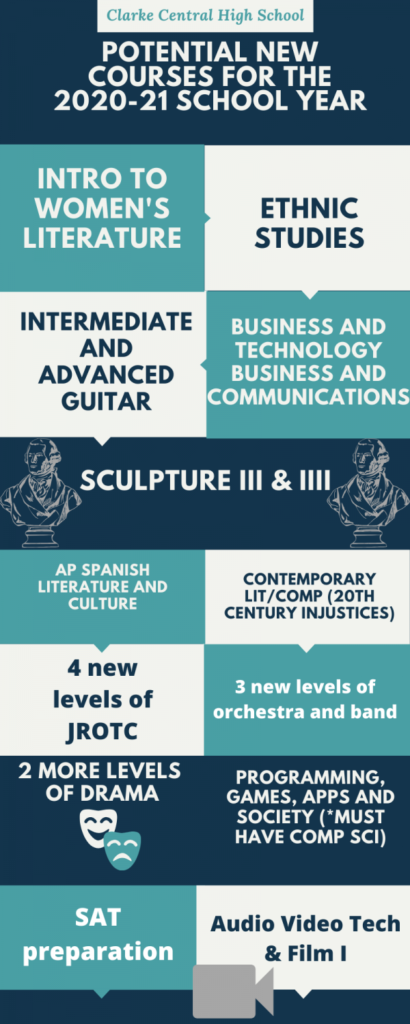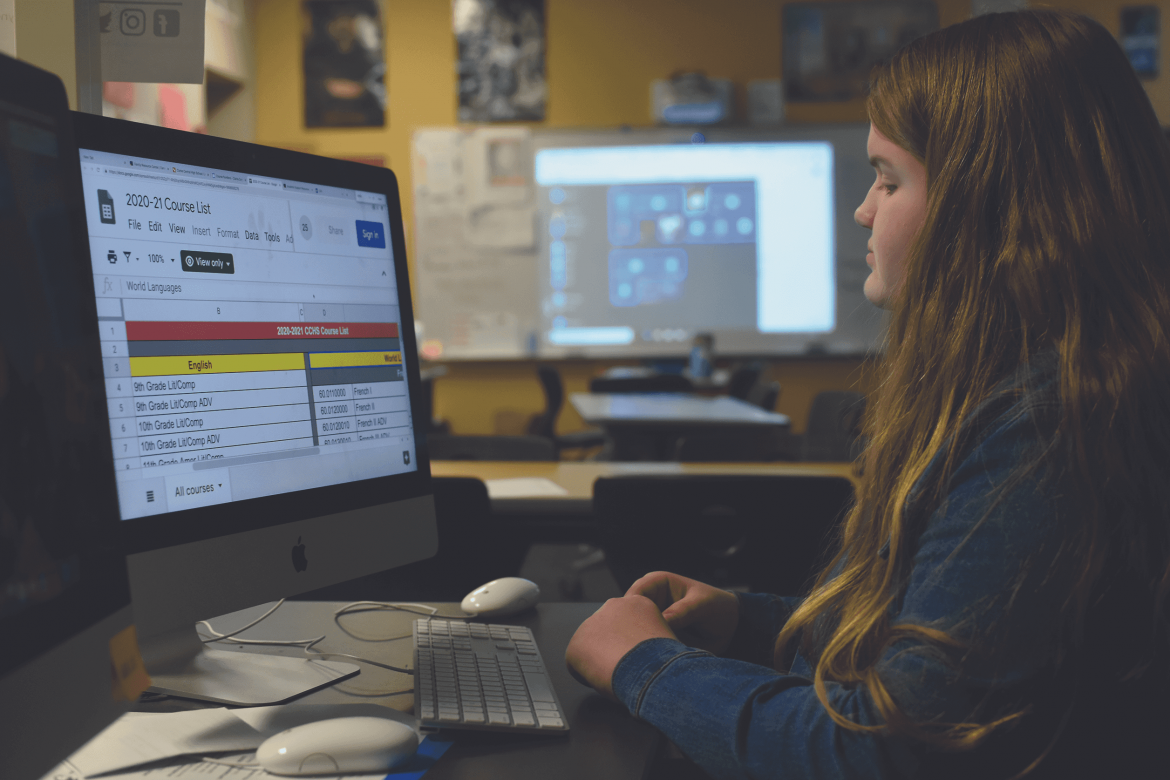Clarke Central High School sophomore Julia Lane looks at new course options for the 2020-21 school year. Lane took the Intro to Guitar class this school year and is thankful that she had that option. “I’ve always wanted to learn how to play (guitar), but I’ve never had a guitar, I’ve never been able to take lessons really, and so it’s like a free class,” Lane said. “(I’m) pretty beginner (at guitar), so I’ve gotten a lot better. I didn’t know anything at the beginning of the year.” Photo by Krista Shumaker
An expanded course catalog will be available to Clarke Central High School students for the 2020-21 school year.
There are 14 new classes being considered for Clarke Central High School in the 2020-21 school year, according to CCHS Assistant Principal Summer Smith. These potential new classes include Introduction to Women’s Literature, Ethnic Studies, Contemporary Literature/Composition, Business and Technology, Business and Communications, SAT preparation, Audio Video Tech & Film I, AP Spanish Literature and Culture and additional levels to a number of other courses.

An infographic shows the new classes being considered at Clarke Central High School for the 2020-21 school year. However, according to CCHS assistant principal Summer Smith, the classes need a certain amount of students to be able be implemented. “It all depends on student interest really, it’s frustrating to want to introduce a class and then not enough interest is there from the kids. So I really need twenty three (students) to make a class. That’s kind of the number that they want us to shoot for,” Smith said. Infographic by Isabella Johnson
“I put a lot (of classes) out there, but if it makes or not depends on whether the class will actually happen, and so we have to have enough interest,” Smith said. “If enough people don’t sign up for it, we wouldn’t offer it.”
Teachers who want to start a new class generally bring the idea to their department chair, who then proposes the class to Smith.
“I usually go to the department chairs and I’m like, ‘Hey, is there something that somebody in your department wants to offer?’ For instance, the African American History (class), there’s a social studies teacher who’s interested in it. She has to go to her department chairs, have a conversation and then come to me and we put it on the list. Then I basically have to ask if it can be added to the program of study, and (it has to be) approved by the (Clarke County School District Board of Education),” Smith said.
The switch to block schedule for the 2020-21 school year will give students the opportunity for an additional class per year, which has created a need for more classes.
“The biggest struggle for us is what can we add given our space confinements. We need things that kids can take that aren’t interested in journalism; (journalism students fill up their) schedule with journalism, band kids fill up their schedule with band, drama kids go to drama. But what about the kid who’s just kind of like, ‘Eh, I don’t care about that stuff ’?” Smith said.
CCHS science department teacher Claude Gonzalez started a Zoology class last year and believes that, if the course is approved by the Board of Education, adding a variety of elective classes to the schedule is a fairly simple process.
“There’s a lot of flexibility in getting (new courses) approved and doing it for the school year,” Gonzalez said. “Last year, (the science co-chairs and I) decided we needed a fourth science for the kids who are not on the chemistry/physics track. I volunteered to do Zoology, which is a class that we used to have around here but haven’t had in years. There was that need (for) the fourth science, and so I was willing to do the work of putting together a curriculum for it.”
“I volunteered to do Zoology, which is a class that we used to have around here but haven’t had in years. There was that need (for) the fourth science, and so I was willing to do the work of putting together a curriculum for it.”
— Claude Gonzalez,
CCHS science department teacher
CCHS sophomore Julia Lane took the Intro to Guitar class this year and feels that a new level would allow her to keep up the skills she’s learning now.
“I didn’t know anything at the beginning of the year, so I’ve gotten a lot better,” Lane said. “If there wasn’t a higher (level), I might not want to take (guitar again) cause it would kind of be the same thing. (It’s important for students) to have more options to take higher classes.”
These new levels and new courses will all have to adjust to the new time frame that their classes will be operating on.
“You can’t stand up on block (schedule) for an hour and a half and just talk at kids, and you also can’t just teach for an hour and then say 30 minutes of homework time,” Smith said. “Teachers are gonna have to learn how to adapt how they teach so that there’s some teaching and some doing by students. That takes students a little bit to get used to.”
